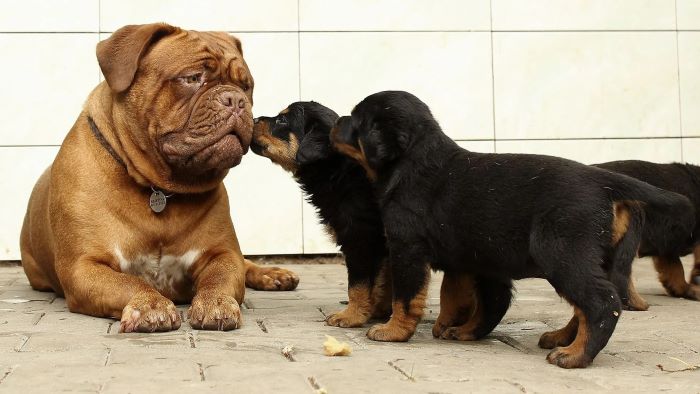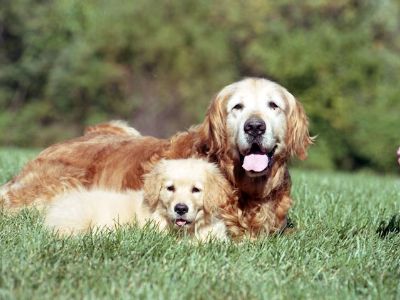As a dog owner, when you pet a new puppy in your house or, you pet one, it’s obvious to wonder – When can my puppy meet other dogs? This question bugs every dog owner regardless of their experience of owning a dog for longer periods. But, why?
A simple distinction explaining this phenomenon – a newbie is eager for their furry friend to meet other dogs and an experienced owner is looking for a precise timing based on their prior experiences of socialising their pups.
So, if you are curious about when can puppies meet other dogs, keep reading. This article will help you break down this aspect and provide you with some precise reasons pertaining to your curiosity.

You Might Also Like:
When Can My Puppy Meet Other Dogs?
Your puppy can easily meet with other dogs once they hit the 2-month mark[1]. But, before they interact with other canines, you need to ensure they are fully vaccinated. Otherwise, they may suffer from diseases like distemper, or parvovirus.
Likewise, you need to make sure the dogs with whom they are interacting are also vaccinated and trustworthy. Avoid taking your pup to places where you may encounter unvaccinated canines.
But, why is the interaction needed in the first place?
Reasons for socialising puppies
Well, it’s crucial for your pup to interact and socialise with other canines for their personal growth. They are used to the wildlife environment and their primal instinct is to connect with their fellow canines. When you introduce your pup to another canine, it helps in:
- Building their confidence
- Improve their bonding skills
- Reduce fear
Further, when your furry friend is socialising with other canines, you are ensuring the following things:
- They get exposure to new environments and experiences
- Meet new people
- Interact with different animals, especially canines
When Can Puppy Meet Other Dogs – Preparation

Preparing your dog before you plan their puppy meeting with other dogs is crucial. You don’t want to risk exposing them to a company of dogs with pre-existing health issues or who are not vaccinated. So, here are some of the prospects for preparing your dog for a social meet:
- Vaccination
The most crucial aspect of preparation is getting your pup vaccinated before any social meet. This helps in reducing the health risks and you won’t have to worry about your fellow canines’ vaccination status.
They start receiving their core vaccines once they turn 6 weeks old. But, till then you must make sure you don’t make your pup interact with other pups or dogs, especially if they are unvaccinated. Likewise, the fellow dog owner is also concerned about your pup’s health.
So, you must ensure that your furry friend is in a healthy state, and free of any hazardous disease or infection.
- Venue
While arranging a meeting with the other dog selecting a venue becomes important. The best way to avoid any radical behaviour is to agree on a neutral venue. A neutral venue will ensure neither dog associates it with their previously visited public places and hence, they will not portray any aggressive or defensive behaviour.
In addition, a neutral location also facilitates stimulation for both the pups as they will try and explore the surroundings. They may bond while exploring the new location.
- Monitoring
You need to keep an eye on your furry friend while they are interacting with a fellow canine. Because there is no anticipating their behaviour and the interaction may escalate into a fight instantly. Look for any signs suggesting any suspicious behaviour and intervene when necessary.
To avoid such a situation, you can train your pup to interact with other people at home. This can work and the social meeting might not be hindered.
- Training
You need to train your dog at home to follow your cues. Teaching some cues or commands will ensure your dog will follow your instructions in case the situation escalates. For instance, the fellow canine gets aggressive or your pup.
To train your dog for specific behaviour you must know their triggers. For example, if a stranger walks in and your dog gets aggressive you can associate the “stop” command. These small things can have a major impact on how well your pup’s social meet concludes.
Things to look out for on the first meet

Your pup is young and even with sophisticated training, things may go sideways. Hence, it’s necessary to analyse their behaviour and look out for different signs and emotions exerted.
You also need to observe the fellow canine closely to determine if the aggressive behaviour of your dog was instigated because of any such instance. Here are some crucial aspects to look out for in the first meet:
- Body language
See how your pup is interacting with the fellow canine. Observe the subtle changes in their body language and have a closer look at their eyes, ears, mouth and tail. This helps in figuring out a possible gesture that they may make towards their fellow canine.
While observing this make sure you avoid any sort of eye contact. They may comprehend this as a threat or challenge. You may see the dogs in a relaxed state and along with that some loose wagging, soft eyes, and open mouths. This is normal but, if you see them growling then you must control their behaviour.
- Interaction
When your pup meets its fellow canine, you will see them sniff each other. This is their way of greeting and if they are gently doing this there is nothing to get worried about. However, if the sniffing behaviour prolongs for a longer period, you need to separate them.
Continuous sniffing may often cause tension or discomfort. This can lead to pups fighting and it’s unpleasant. You must immediately redirect their attention and prevent this from happening.
- Playing behaviour
Have a close watch on your furry friend while he plays with a fellow dog. Make sure they are not hurting each other while wrestling, or rolling over. You can pause their activity and check on them for possible injuries.
In addition, you must ensure they have the same toy to play with. Because if they have different toys they might develop competitive emotions or get jealous of each other.
Things to avoid for dog owners
As a dog owner, there are certain things you must consider from your side to make sure that you don’t hinder the social meeting of your furry friend. Here are a few of the prominent things to consider:
- Punishing or yelling
While you are introducing your pup to another dog, they might act or behave radically. Regardless, you must not yell or scold them at that moment. This can leave a fearful impression in their minds and they might get scared on their next social encounter.
The simplest solution is to separate your dog and help them calm down. This will help them know that you care and they won’t hesitate or get anxious on their next meet.
- Harness
Using a harness may either work or not. Because if you unintentionally tighten the lead, regardless of the reason, your dog will get aggressive. The fellow canine may also respond with aggressive barking and it may trigger a potential dog fight. So, it’s for the best to avoid using a harness.
What Happens If You Fail To Socialise Your Pup?
Failing to socialise your pup may have an adverse effect on your pup’s life. It can have a mental effect on your furry friend, and this may lead to different behavioural or health issues that you don’t want your furry friend to have. So, here are some potential outcomes or consequences of failing to socialise your pup:
- Feel fearful
If your pup is not socialised, it will get scared while seeing new things, and get afraid while being in a new environment. They have no prior exposure to such elements and this makes them anxious. Also, they don’t play well with changes around them. So, any different sound, smell, or activity can register fearful feelings in their minds.
- Behavioural issues
Lack of socialisation will cause various behavioural problems in your pup. Along with fearfulness, your pup may also get aggressive. Dogs with such behavioural traits are tagged as unsuitable pets. They are either sent to rescue or shelter homes. In some cases, if the behaviour is extreme, they are even euthanized.
- Disobedient
Your pup will not obey your commands and also, resist your touch while you try to cuddle or groom them. Lack of interaction with fellow canines and other people will make them sensitive. They won’t tolerate any touch near their private parts such as their paw, mouth, nose, ear, butt, or nails.
- Resisting to leave the house
Failing to socialise with your pup may also make them resist leaving the house. This happens because they are not willing to breach their comfort zone. So, you’ll see them ignore and resist any outdoor activity such as walks, car rides, or any other playing exercise.
- Lack of awareness
A pup who has not had exposure to the outside environment or any social contact will not respond well to any threatening or stressful scenario. This happens because of a lack of awareness. They simply don’t know what is the way to tackle such a situation.
So, if they encounter a stranger near the house, or a dog, or a weird sound they will panic. You will see them bark constantly, growling, snarling, or biting on things. They behave like this in an attempt to make the danger go away.
- Feel distressed in the presence of other animals
The lack of socialisation will make your dog jealous and uncomfortable if you bring a new pet or dog into the house. This will make them more aggressive as they will feel insecure. You will see them maintain a distance from them and also try and hide their stuff. If they get into a fight they may hurt themselves.
- Uncomfortable around other people
When your pup hasn’t had any socialisation, they will also reject the company of other people. For instance, if you invite your relatives or friends over, your dog will not trust them and they may exhibit hostile behaviour. This puts other individuals at risk, especially if you have children.
- Scared sound
A pup who has no exposure to the outer wildlife environment will easily get scared by a random sound. For instance, the sound of the police sirens, vehicles passing through, or the fire alarm within the house. They might start having a Zoomie episode but, most often you will see them hiding somewhere.
- Immunity issues
Socialising with other pups can help improve their immune system. If your dog is not having enough exposure to the outside world, their immunity system will get weaker. They may suffer from infectious diseases such as parvovirus or distemper.
- Lack of exercise
Socialisation helps in providing much-needed physical and mental stimulation. Not receiving enough exercise can cause different issues for your furry friend. They will feel bored, and less release of energy may also lead to zoomie or hyperactivity. In addition, the pup may also have obesity, heart disease, and at times trigger destructive behaviour.
These are some of the potential outcomes if a pup is not socialised. So, if you are maintaining the socialising habit within the critical window i.e. between the ages of 3 weeks to 14 weeks then your pup will not face these consequences. However, different breeds have different sensitivities and socialising depends on a variety of factors.
Factors affecting the socialisation of pups
Socialising pups is not easy. There are many breeds and you need to make a strategy for socialising them accordingly. A simple example – small dog breeds like pugs may not need much effort because of their friendly nature whereas large dog breeds such as German Shepherd will demand more effort. So, let’s get some details regarding these factors.
#1 Genetics
Pup’s genetics hugely impact their temperament and behavioural aspects. It’s a crucial factor as they may inherit certain traits from their parents. Training them accordingly will take some time. You may also have to vary your training methods according to their personality, curiosity and physical prospects. Whatever strategy you come up with, make sure you don’t miss the socialisation window of 3-14 weeks.
#2 Timeframe
As I keep mentioning, you need to socialise your pup within the timeframe of 3 to 14 weeks of age. This time period is considered critical because a pup’s brain is most receptive in this period. They can easily form associations and comprehend different situations.
However, this doesn’t imply that you cannot socialise your dog after 14 weeks of age. Yes, you may miss the timeframe but, with extra effort and regular process, you can easily socialise them. So, it’s not impossible.
#3 Strategy for socialising
The strategy you use for your pup will play a huge role in socialising your pup. Because if you don’t use a proper strategy, regardless of their genetics, they will have a tough time adjusting socially. For example, if you are harsh on your pup, or you use lead while meeting with another dog, they will set up a negative impression in their mind.
Hence, it’s important your furry friend feels happy and is excited about socialising activities. The simplest way to make it fun is to allow them to learn this at their own pace. This also means you must not use a harness or muzzle, yes, your job will get tougher but, it’s important you make them feel comfortable while socialising.
#4 Environment
As I mentioned earlier, the place where you plan on meeting with other canines has a big impact on how the social meeting concludes. The surrounding environment of that location plays a huge role in facilitating social behaviour.
The best example explaining the impact of a public venue such as a restaurant and a park. Imagine which location will serve the purpose better. A restaurant place is not bad but, some don’t allow dogs and even if they do, if the dog’s behaviour gets out of control then the situation may escalate quickly.
Hence, picking an open environment is crucial. Both dogs can play and explore the terrain together. It remains one of the best approaches to date for beginning to socialise your dog.
All these factors will have a significant impact. You have to make sure you start socialising with your pup at an appropriate age. If you feel confident you can also begin it when they are 2 months old and not vaccinated.
FAQs
Can my puppy meet other dogs after the first vaccination?
In general, it’s safe for your dogs to meet other dogs after the first vaccination. While you schedule a meeting, make sure you avoid public places where your dog might get allergies or infections. Also, if you are not aware of the other dog’s vaccination status, you must not meet them. For complete safety, vets recommend getting 3-4 vaccinations before you take your dog outside.
An unvaccinated puppy is meeting with the vaccinated dog, is it OK?
An unvaccinated puppy meeting with a vaccinated dog is fine. Your dog will have no infection and they can easily socialise with them. You have to make sure that your dog is not suffering from any health disease or infection. Vice versa, if the other dog is not vaccinated you must check with their owner about their health and vaccination status.
Can my 8-week-old puppy meet other dogs?
Normally, there is no harm in allowing your 8-week-old pup to meet other dogs but, there are many risks involved. Even with proper vaccinations, your dog may catch some viruses and their health condition gets worse. So, many vets suggest you arrange some playdates within the house. This will reduce the risk of the dog catching any sort of bacteria.
Is it bad for dogs to not socialise?
Not socialising your dog is bad for your dog’s overall health and in terms of growth. A dog that is not socialised at an early age is likely to show aggressive behaviour, fearfulness, and other behavioural issues. Many studies have shown that a pup receiving socialising at an early age will not sustain these health issues.
Final Remarks On When Can My Puppy Meet Other Dogs
The general time frame for your pup to meet other dogs is when they are 3 weeks to 14 weeks in age. As a new dog owner, you may face challenges and also feel anxious about approaching this situation. There are many reservations in mind which make you not socialise too soon but, you cannot avoid it.
Consult a vet, and get some tips on how you can overcome those reservations and begin socialising your dogs. In fact, if you make your strategy according to different factors and details mentioned earlier in the article, you’ll be just fine.
For experienced dog owners, the challenges are less but, they have to stay vigilant. This means, continuously monitoring their dog’s behaviour and making sure they are not showing any signs of distress or aggression.
Reference:
- Bauhaus, J. (2024, January 9). When can my puppy meet other dogs? American Kennel Club.






